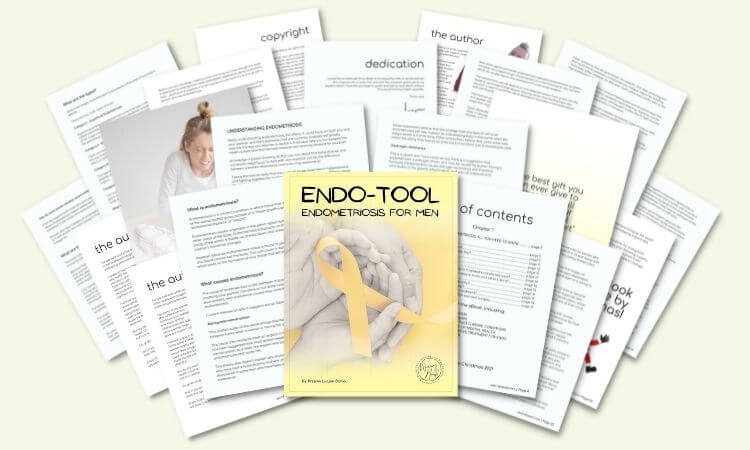Navigating Endometriosis-Related Mood Fluctuations
Throughout my wife’s battle with stage 4 endometriosis, navigating endometriosis-related mood fluctuations was challenging, to say the least. Today is no different. So how do we cope to keep our marriage healthy and sane?
Navigating endometriosis-related mood fluctuations can be challenging. Endometriosis, a chronic gynecological condition, is known to impact mood. Understanding these fluctuations and seeking support from healthcare professionals can help you manage your emotional well-being while living or caring for someone with endometriosis.
- Navigating Endometriosis-Related Mood Fluctuations
- The Physical Symptoms of Endometriosis
- The Emotional Impact of Endometriosis
- How Endometriosis Affects Intimacy
- Coping Strategies for Couples
- The Fertility Implications of Endometriosis
- Managing Mental Health with Endometriosis
- Lifestyle Changes for Emotional Wellness
- Seeking Support for Endometriosis-Related Mood Fluctuations
- Thriving Despite the Challenges
- Source Links for Navigating Endometriosis-Related Mood Fluctuations
Navigating Endometriosis-Related Mood Fluctuations
Endometriosis can have a profound impact on your quality of life, affecting not only you but also those around you. Alongside physical symptoms like pelvic pain, painful periods, and heavy bleeding, endometriosis can also trigger emotional changes such as mood swings, anxiety, and even depression. Understanding the emotional impact of endometriosis is crucial in taking steps towards emotional wellness and managing the hormonal imbalances that contribute to these mood fluctuations.
In this article, we will explore strategies for balancing your moods while coping with endometriosis. From self-care tips to understanding the emotional impact of this condition, we will provide insights and support to help you navigate this journey. Let’s empower ourselves to overcome the challenges of endometriosis and embrace a life filled with emotional well-being and resilience.
The Physical Symptoms of Endometriosis
Endometriosis is a condition that can cause a range of physical symptoms, impacting the daily lives of those affected. Understanding these symptoms is crucial in managing the condition effectively. Common physical symptoms of endometriosis include:
- Pelvic Pain: One of the most prevalent symptoms of endometriosis is pelvic pain. This pain can be chronic and severe, often interfering with daily activities and intimacy.
- Painful Sex: Endometriosis can make sexual intercourse painful, leading to discomfort and strain in intimate relationships.
- Heavy Menstrual Bleeding: Many individuals with endometriosis experience heavy menstrual bleeding, which can lead to fatigue and anemia.
- Dyspareunia: Painful sex, known as dyspareunia, is a common symptom of endometriosis. It can cause sharp or burning pain during or after intercourse.
These physical symptoms can significantly impact the quality of life and emotional well-being of individuals with endometriosis. Understanding and addressing these symptoms is essential for managing the condition effectively.
If you want to learn more about endometriosis, I wrote an “Endo-Tool, Endometriosis for Men” e-Book.
You can get the 1st Chapter of the e-Book for FREE, and if you like it, you’ll get a Whopping 33% Discount on the Whole Book, plus discounts on other helpful tools. You have nothing to lose but a lot to gain!
The first chapter alone contains all the comprehensive medical knowledge about endometriosis, including:
- What is endometriosis?
- What are the symptoms?
- What causes endometriosis?
- What does endometriosis look like?
- What are the stages?
- What are the types?
- What is adenomyosis and how is it related to endometriosis?
- Why do some women develop severe endo and others don’t?
- Does endometriosis cause infertility?
- How is endometriosis diagnosed?
- Do types and stages affect the treatment?
- Recurrence of endometriosis after excision surgery.
FREE Chapter of “Endo-Tool”
Endometriosis e-Book for Men

Detailed Table of Physical Symptoms
| Symptom | Description |
|---|---|
| Pelvic Pain | Chronic and severe pain in the pelvic region, impacting daily activities |
| Painful Sex | Discomfort and pain experienced during sexual intercourse |
| Heavy Menstrual Bleeding | Excessive and prolonged menstrual bleeding, leading to fatigue and anemia |
| Dyspareunia | Sharp or burning pain during or after sexual intercourse |
The Emotional Impact of Endometriosis
Living with endometriosis can have a profound emotional impact on individuals. The physical symptoms of the condition, such as pelvic pain and heavy bleeding, can often lead to feelings of isolation, anxiety, and depression. It’s important to recognize and address these emotional challenges in order to navigate the complexities of endometriosis effectively.
Endometriosis can cause individuals to feel isolated, both physically and emotionally. The pain and discomfort associated with the condition can make it difficult to participate in social activities and connect with others. This sense of isolation can further exacerbate feelings of anxiety and depression, creating a cycle of emotional distress.
Anxiety and depression are common emotional responses to living with endometriosis. The uncertainty surrounding the condition, the impact it may have on fertility, and the fluctuating nature of symptoms can all contribute to increased levels of anxiety.
Depression can arise from chronic pain and the challenges of managing the physical and emotional aspects of the condition. Seeking support from healthcare providers, joining support groups, and engaging in therapy can provide valuable tools for managing these emotions and fostering a sense of connection and understanding.

The Importance of Support
Support from loved ones, healthcare professionals, and others affected by endometriosis can make a significant difference in managing the emotional impact of the condition.
It’s crucial to communicate openly about your feelings and needs with your partner, family, or friends. This can help alleviate the distance that may occur in relationships due to the challenges of endometriosis. Seeking support from professionals who specialize in endometriosis and connecting with others who share similar experiences can provide a sense of validation and empowerment.
Remember, you are not alone in your journey with endometriosis. Reach out for support, prioritize your emotional well-being, and explore strategies that work best for you. Managing the emotional impact of endometriosis is a process, but with the right support and self-care, you can navigate these challenges and live a fulfilling life.
| Support Strategies | Benefits |
|---|---|
| Open communication with loved ones | Reduces feelings of isolation and increases understanding |
| Joining support groups or online communities | Provides emotional validation and practical advice |
| Seeking therapy or counseling | Develops coping strategies and provides professional support |
How Endometriosis Affects Intimacy
Endometriosis can have a significant impact on intimacy and sexual relationships. The physical symptoms of endometriosis, such as pelvic pain and painful sex, can make it difficult to engage in sexual activity and can lead to sexual dysfunction. This can cause frustration, disappointment, and strain in a relationship. Communication between partners is crucial in navigating the challenges that come with endometriosis and maintaining a fulfilling intimate relationship.
When endometriosis affects intimacy, it’s important to explore alternative forms of intimacy that don’t involve sexual intercourse. Cuddling, holding hands, and engaging in non-sexual touch can help maintain a close connection while managing symptoms. It’s also essential to have open and honest communication about desires, boundaries, and any physical or emotional discomfort. Creating a safe space to express concerns and find solutions together can strengthen the bond between partners and foster understanding.
Seeking medical interventions and support from healthcare providers can play a crucial role in improving sexual well-being. A healthcare professional specializing in endometriosis can offer guidance, recommend treatments, and provide resources to address sexual dysfunction. It’s important to discuss any concerns or difficulties openly and work together to find the best solutions for both partners.
Impact of Endometriosis on Intimacy
| Challenges | Impact |
|---|---|
| Pelvic pain | Can cause discomfort or pain during sexual activity |
| Painful sex (dyspareunia) | Can lead to avoidance of sexual intercourse and decreased sexual satisfaction |
| Physical limitations | May require adapting sexual positions and activities to accommodate pain or discomfort |
| Emotional strain | Can cause frustration, disappointment, and strain in the relationship |
| Communication challenges | May lead to misunderstandings, misalignment of expectations, and feelings of disconnectedness |
By addressing the impact of endometriosis on intimacy openly and seeking support, couples can navigate these challenges and find ways to maintain a fulfilling and satisfying relationship. Remember, you are not alone, and there are resources available to help you and your partner address the impact of endometriosis on intimacy.

Coping Strategies for Couples
Living with endometriosis can be challenging not only for the individual experiencing it but also for their partner. Coping with endometriosis-related mood fluctuations as a couple requires open communication, understanding, and support. By working together, you can navigate the emotional complexities that come with this condition and strengthen your relationship.
Here are some coping strategies that can help both partners:
- Practice self-care: Taking care of yourself is essential for managing the emotional impact of endometriosis. Make time for activities that bring you joy and relaxation. Engage in regular exercise, practice mindfulness or meditation, and prioritize rest and relaxation.
- Open communication: Communication is key in any relationship, especially when facing the challenges of endometriosis. Share your emotions, needs, and concerns with each other. Be empathetic and understanding, and actively listen to each other’s perspectives.
- Seek professional help: Consider seeking support from healthcare providers, therapists, or counselors who specialize in endometriosis. They can provide guidance, coping strategies, and tools to navigate the emotional impact of the condition.
- Build a support network: Connect with other couples or individuals who are going through similar experiences. Join endometriosis support groups or online communities where you can share your stories, gain insights, and receive support from others who understand what you’re going through.
Remember, coping with endometriosis as a couple is a journey that requires patience and understanding. By implementing these coping strategies and supporting each other, you can navigate the challenges and strengthen your bond.
| Coping Strategies for Couples | Benefits |
|---|---|
| Practice self-care | – Promotes emotional well-being – Reduces stress and anxiety – Increases resilience |
| Open communication | – Enhances understanding and empathy – Builds trust and connection – Reduces misunderstandings and conflicts |
| Seek professional help | – Provides guidance and coping strategies – Offers a safe space to express emotions – Facilitates problem-solving |
| Build a support network | – Provides emotional validation and support – Shares experiences and insights – Reduces feelings of isolation |
The Fertility Implications of Endometriosis
Endometriosis can have a significant impact on fertility, causing infertility in various ways. This can be emotionally distressing for individuals and may place strain on relationships as couples navigate the challenges of fertility issues. It is important for couples facing endometriosis-related infertility to explore all available treatment options and make decisions together that align with their values and goals.
Seeking support from fertility specialists and reproductive health experts can help individuals and couples navigate the emotional complexities that arise from endometriosis-related infertility. It is important to remember that each person’s journey is unique, and there is no one-size-fits-all approach to fertility treatment.
Open and honest communication between partners, as well as with healthcare providers, is crucial in decision-making and finding the most suitable path forward.
| Treatment Options for Endometriosis-Related Infertility | Success Rates | Emotional Impact | Considerations |
|---|---|---|---|
| Surgical Interventions | Varies depending on the individual | Can provide hope and relief, but also may involve recovery time and potential risks | Discuss with a medical professional to determine if surgery is a suitable option |
| Assisted Reproductive Technologies (ART) | Success rates vary depending on the specific ART method used | Can be emotionally challenging due to the uncertainty of outcomes and the financial costs involved | Consider the emotional and financial implications before pursuing ART |
| Fertility Preservation | Varies depending on the individual | Provides an option for individuals who wish to preserve their fertility before undergoing treatments that may impact their reproductive system | Discuss with a fertility specialist to determine if fertility preservation is a suitable option |

Emotional Impact of Endometriosis-Related Infertility
The emotional impact of endometriosis-related infertility can be profound. Couples may experience feelings of grief, loss, and frustration as they navigate the challenges of trying to conceive. It is important for individuals and couples to seek emotional support from therapists or support groups, as well as lean on each other for understanding and encouragement.
Building a strong support network and maintaining open lines of communication can help individuals and couples cope with the emotional rollercoaster that comes with endometriosis-related infertility.
Managing Mental Health with Endometriosis
Living with endometriosis can take a toll on your mental health. The physical symptoms, the uncertainty of the condition, and the impact it has on your daily life can lead to feelings of depression and anxiety. It’s important to prioritize your mental well-being and seek help when needed.
If you’re experiencing symptoms of depression, such as persistent sadness, lack of interest in activities, or changes in appetite and sleep patterns, it’s essential to reach out to a healthcare professional. They can provide you with guidance and support, and may recommend therapy or medications to help manage your symptoms. Remember, seeking help is not a sign of weakness, but a brave step towards taking care of yourself.
Anxiety is another common mental health challenge faced by individuals with endometriosis. If you’re feeling overwhelmed, constantly worrying, or experiencing panic attacks, it’s crucial to seek support. Therapy can provide you with coping strategies to manage anxiety and reduce stress. Additionally, practicing self-care activities, such as relaxation techniques, exercise, and engaging in activities you enjoy, can also help alleviate anxiety symptoms.
Remember, you don’t have to face the challenges of endometriosis alone. Reach out to loved ones for support, join online communities or support groups where you can connect with others who understand what you’re going through, and lean on healthcare professionals for guidance. Taking care of your mental health is an important part of managing endometriosis and living a fulfilling life.
Treatment Options for Mental Health with Endometriosis
| Treatment Option | Description |
|---|---|
| Therapy | Working with a therapist can provide you with coping strategies and support to manage depression and anxiety. |
| Medication | In some cases, antidepressants or anti-anxiety medications may be prescribed to help manage symptoms. |
| Support groups | Joining support groups or online communities can provide you with a sense of belonging and understanding. |
| Self-care practices | Engaging in activities that promote relaxation, self-compassion, and stress reduction can support your mental well-being. |
Lifestyle Changes for Emotional Wellness
Managing endometriosis-related mood fluctuations requires a holistic approach that includes making lifestyle changes to promote emotional wellness. By incorporating stress management techniques, practicing self-care, and adopting healthy habits, you can better manage your emotions and enhance your overall well-being.
Stress management: Chronic stress can exacerbate mood fluctuations, so finding effective stress management techniques is crucial. Consider incorporating activities such as meditation, deep breathing exercises, or yoga into your daily routine to help reduce stress levels and promote emotional balance.
Self-care practices: Prioritizing self-care is essential for emotional wellness. Engage in activities that bring you joy and relaxation, whether it’s taking a warm bath, reading a good book, or spending time in nature. Taking care of your physical and emotional needs will help you navigate the challenges of endometriosis more effectively.
Healthy habits: Making certain lifestyle changes can have a positive impact on your emotional well-being. This includes maintaining a balanced diet rich in nutrients, getting regular exercise, and ensuring you have enough sleep. These habits can help regulate hormones, improve mood, and increase overall resilience.

Lifestyle Changes for Emotional Wellness
By implementing these lifestyle changes, you can take control of your emotional wellness and better navigate the mood fluctuations associated with endometriosis. Remember to be patient with yourself and seek support from healthcare providers and loved ones as you embark on this journey towards emotional well-being.
| Lifestyle Changes | Benefits |
|---|---|
| Stress management techniques | Reduces stress levels and promotes emotional balance |
| Practicing self-care | Prioritizes physical and emotional well-being |
| Healthy habits | Regulates hormones, improves mood, and increases resilience |
Seeking Support for Endometriosis-Related Mood Fluctuations
Living with endometriosis can be challenging, especially when it comes to managing mood fluctuations. However, you don’t have to face these emotional challenges alone. There are various forms of support available that can provide you with the understanding, guidance, and empathy you need to navigate this journey.
Endometriosis Support Groups
Joining an endometriosis support group can be incredibly beneficial. These groups typically consist of individuals who have firsthand experience with endometriosis and understand the emotional impact it can have. Participating in these groups can provide you with a sense of community, validation, and a safe space to share your thoughts and feelings. It can also be an opportunity to gain insights and strategies from others who have found effective ways of managing their mood fluctuations.
Therapy and Counseling
Consider seeking therapy or counseling to help you cope with the emotional challenges of endometriosis. A qualified therapist or counselor can provide you with a supportive environment to explore your feelings, develop coping strategies, and work through any underlying issues that may be contributing to your mood fluctuations. Therapy can be particularly helpful if you are experiencing anxiety, depression, or relationship difficulties as a result of your endometriosis.
Self-Help Resources and Online Communities
There are also a variety of self-help resources available that can provide you with practical tools and techniques for managing your mood fluctuations. Books, podcasts, and online courses specifically focused on endometriosis and mental well-being can offer valuable insights and guidance. Additionally, online communities and forums allow you to connect with others who have similar experiences, providing a platform for shared stories, advice, and support.
Remember, seeking support is a sign of strength, not weakness. Don’t hesitate to reach out and connect with others who can help you navigate the emotional complexities of living with endometriosis. Together, you can find solace, understanding, and strategies for managing your mood fluctuations.
Thriving Despite the Challenges
Living with endometriosis can present many challenges, but it’s important to remember that you have the strength to thrive despite them. Cultivating resilience is key to navigating the ups and downs of this condition. By acknowledging your inner power and embracing a positive mindset, you can overcome the emotional complexities that come with endometriosis.
Self-empowerment plays a crucial role in your journey. Take control of your health by staying informed about endometriosis, understanding your treatment options, and advocating for your needs. By actively participating in your own care, you can empower yourself to make informed decisions and take steps towards better emotional well-being.
Embracing life with endometriosis means finding joy in everyday moments and prioritizing self-care. Discover activities that bring you happiness and make time for them regularly. Surround yourself with a strong support network of loved ones who understand and uplift you. Remember, you don’t have to face this journey alone.
A mindset shift can make a world of difference. Instead of focusing on the limitations of endometriosis, shift your perspective to the possibilities that lie ahead. Acknowledge your resilience, celebrate your victories, and embrace the strength within you. By adopting a positive mindset, you can navigate the challenges of endometriosis with grace and resilience.


About Me
Hi, I’m Lucjan! The reason why I decided to create this blog was my beautiful wife, who experienced a lot of pain in life, but also the lack of information about endometriosis and fibromyalgia for men…
